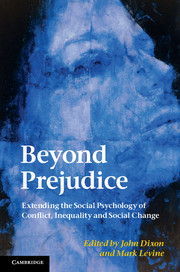Book contents
- Frontmatter
- Contents
- Figures
- Tables
- Contributors
- Acknowledgements
- Introduction
- Part I Beyond prejudice
- Part II Prejudice and social change revisited
- 11 Models of social change in social psychology: collective action or prejudice reduction? Conflict or harmony?
- 12 From attitudes to (in)action: the darker side of ‘we’
- 13 Contact and social change in an ongoing asymmetrical conflict: four social-psychological models of reconciliation-aimed planned encounters between Israeli Jews and Palestinians
- 14 From prejudice to collective action
- Conclusions and future directions
- Index
- References
12 - From attitudes to (in)action: the darker side of ‘we’
from Part II - Prejudice and social change revisited
Published online by Cambridge University Press: 05 June 2012
- Frontmatter
- Contents
- Figures
- Tables
- Contributors
- Acknowledgements
- Introduction
- Part I Beyond prejudice
- Part II Prejudice and social change revisited
- 11 Models of social change in social psychology: collective action or prejudice reduction? Conflict or harmony?
- 12 From attitudes to (in)action: the darker side of ‘we’
- 13 Contact and social change in an ongoing asymmetrical conflict: four social-psychological models of reconciliation-aimed planned encounters between Israeli Jews and Palestinians
- 14 From prejudice to collective action
- Conclusions and future directions
- Index
- References
Summary
The study of intergroup relations has traditionally focused on the role of individual prejudice in motivating discrimination and creating disparities. Prejudice has been classically defined as a negative attitude, in Allport’s (1954) terms ‘an antipathy based on faulty and inflexible generalization. It may be felt or expressed. It may be directed toward a group as a whole, or toward an individual because he [sic] is a member of that group’ (p. 9). Over the past fifty years, in particular, psychologists have invested considerable energy in exploring how interventions, such as appropriately structured intergroup contact, can reduce prejudice (Pettigrew and Tropp, 2006). In addition, stimulated by the classic work of Tajfel and Turner (1979), recent approaches have also examined how group perceptions and identity can influence intergroup prejudice (Brown, 1996) and inform strategies for reducing bias (Gaertner and Dovidio, 2010). Extending the line of analysis presented by Wright and Baray in the previous chapter, this chapter acknowledges the benefits of these frameworks for improving intergroup attitudes and relieving immediate tensions but also suggests that such approaches, in isolation, may have unintended consequences that inhibit action by members of disadvantaged and advantaged groups towards social structural changes towards equality in the longer term.
We focus our analysis in this chapter on a line of research that we initiated over twenty years ago on the common ingroup identity model (Gaertner and Dovidio, 2000, 2009; Gaertner et al., 1989, 1993). Previous research on prejudice reduction had, over an extended period, identified positive intergroup contact as a potent intervention for reducing prejudice and investigated the parameters (e.g. equal status and cooperative interaction) that moderated the effectiveness of contact (Pettigrew and Tropp, 2006, 2008). The common ingroup identity model, in contrast, considered the psychological processes – specifically, cognitive representations of social groups – that mediate the impact of various conditions of contact on reductions in prejudice.
- Type
- Chapter
- Information
- Beyond PrejudiceExtending the Social Psychology of Conflict, Inequality and Social Change, pp. 248 - 268Publisher: Cambridge University PressPrint publication year: 2012
References
- 11
- Cited by



